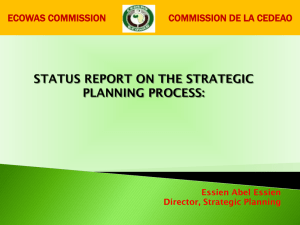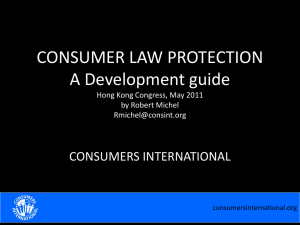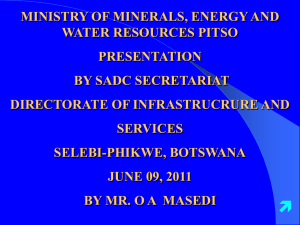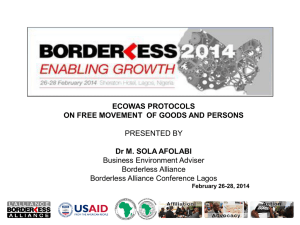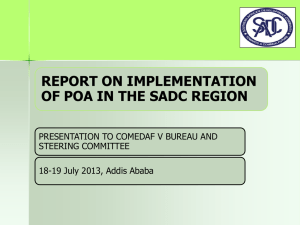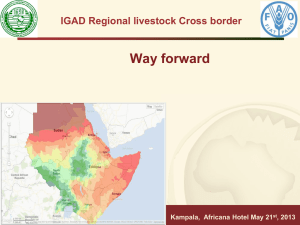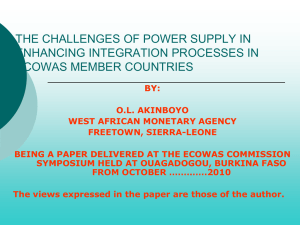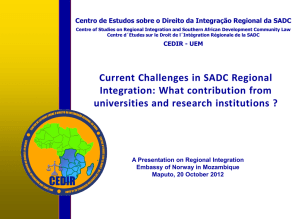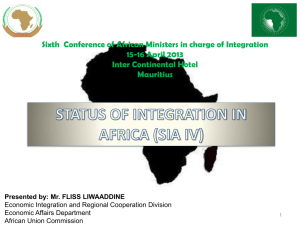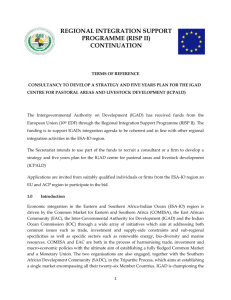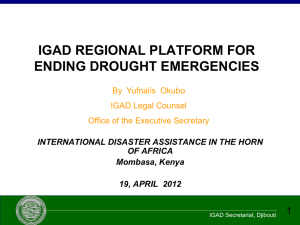Regional Economic Communities
advertisement
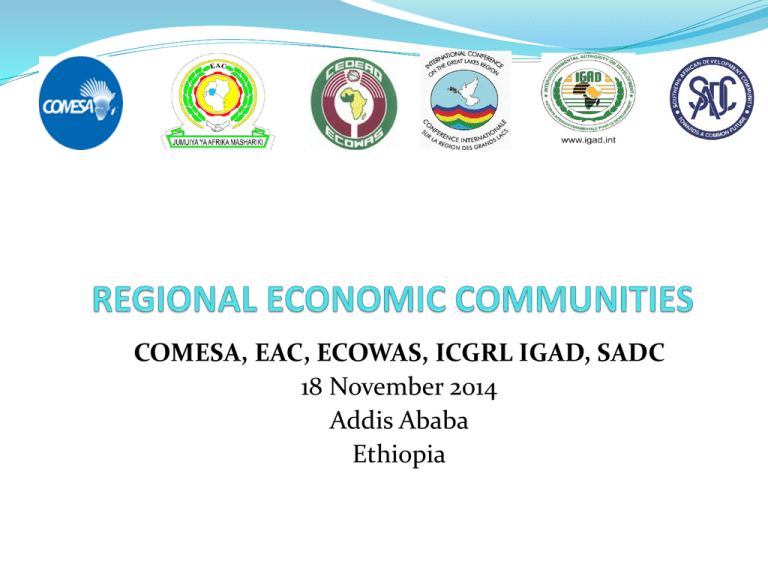
COMESA, EAC, ECOWAS, ICGRL IGAD, SADC 18 November 2014 Addis Ababa Ethiopia MANDATE OF THE RECS Coordination and facilitation of Member States to implement their gender commitments; Policy development and harmonisation; Capacity Building in Gender mainstreaming and Women’s empowerment; Advocacy and lobbying on key gender issues; Monitoring and Evaluation of progress made by MS in implementing gender commitments. Developed Legal and Policy Frameworks Treaties signed by Heads of States that prioritize gender(ALL). Social Charter(COMESA); Protocol on Gender Development(SADC) reflecting commitments in the BPFA,CEDAW and MDGs amongst others with 28 substantive targets; ECOWAS has a draft Protocol on Equality between men and women for Sustainable Development ) Gender Policies aligned and informed by International and Continental instruments (SADC ,ECOWAS, IGAD, COMESA,ICGLR, EAC has a draft Gender Bill); Overall Strategies and programs are gender mainstreamed (ALL) Established Institutional Mechanisms Established Gender Centres , Directorates, Programs, Units and Centres; Established and functional Committees of Ministers of gender and Women’s Affairs; Established and functional Committees of Senior Officials(PSs and Directors); Committees(Permanent/Adhoc ) Technical Committees established and functional; IGAD and the ICGLR have Women and Peace Forums. Developed Strategies, Tools and Guidelines for Gender Mainstreaming and Women’s empowerment Regional Action Plans /Business Plans (ALL) Gender Mainstreaming Toolkit(SADC) / or Guidelines(ECOWAS,EAC, and IGAD has a draft,) Gender and Development Manual(ECOWAS); Gender Peace and Security Framework including Regional Action Plans for 1325 (ECOWAS,SADC IGAD,EAC in the process); Framework for Achieving 50:50 gender Parity in Political and Decision Making (SADC and IGAD) Guidelines and checklists to mainstream Gender in Sectors Climate Change, Agriculture, Food Security Environment; Trade , Water, Energy, Migration, Trafficking, Labour(ALL) Developed Women’s Empowerment Programmes @ Regional level Women in Politics and decision Making (Training of Parliamentarians and women in politics, Training on Gender, affirmative Action, and Gender in Elections); Workshops on Women in Politics , Publishing statistics on Women in Politics; Women’s Economic Empowerment – Women in Business Platforms(SADC,ECOWAS, EAC,IGAD in the process ),Establishment of Women’s Economic Empowerment Fund(COMESA), Women’s Financial Facilities for Women in Business(EAC)Scholarships for girls(ECOWAS), Agricultural inputs to women farmers(ECOWAS),Seed Money to Women in Business(ECOWAS); Peace and Security- Regional Frameworks; Regional Plans of Action, Regional capacity development on mediation, training on peace negotiations, training on conflict management, gender and election; Gender Based Violence- including combatting trafficking in persons: Regional Projects on GBV and TIP(SADC), Technical Capacity Building , Advocacy including Africa Unite Campaign; Prevention of Fistula Projects(ECOWAS). HIV and AIDS including Sexual Reproductive Health (regional and cross boarder) IGAD Strengthened Networking and Partnerships building.. Parliaments Women’s Parliamentary Caucus Parliamentary Forums (SADC PF) Civil Society Regional Organisation for Women in Peace and Security(ECOWAS) Alliance on the SADC Protocol on Gender (SADC); East African Sub Regional Support Initiative for Advancement of Women; Academia Research Institutions and Academia UN Organisations Strengthened Monitoring and Evaluation Annual Progress Reports to Ministers of Gender, Council of Ministers and Summit; Gender Situation Reports (ECOWAS); SADC Gender Monitors every two years and now preparing for 2015 ); SADC Gender Barometer(Civil Society); Monitoring Tools to gender(COMESA,SADC,IGAD,EAC,ECOWAS). monitor RECOMMENDATIONS GOING FORWARD Strengthened institutional mechanisms to facilitate the implementation of gender-related policies and plans of action - this will include coordination mechanisms, accountability mechanisms and performance indicators. Strengthened harmonisation of national policies and legal frameworks with regional policies (closing the gap between policy and practice) Increased Capacity of MS through awareness, knowledge building and exchange on gender mainstreaming and women’s empowerment for sustainable development; Strengthened support and capacity for all Gender machineries (government and civil society) including allocation of financial and human resources, putting in place viable structures and quality training programmes to provide requisite analysis and gender planning. RECOMMENDATIONS……CONT Strengthened partnerships between Government Ministries, women organisations, the private sector and civil society partners; Strengthened linkages between RECS , AU and UNECA to advance the GENDER continental agenda; Increased facilitation of knowledge sharing and dissemination of good practises on gender equality and women empowerment across the regions; Strengthened gender dis-aggregated data collection, operations and action research, and development of appropriate gender indications; Strengthen Monitoring and Evaluation thru the usage of tools and scorecards RECOMMENDATIONS Cont……………… Develop frameworks and strengthen programmes for training, mentorship young women for leadership roles; Develop and strengthen high level gender advisory Regional level think Tank as a response group for gender issues; RECS to establish regional Financial and Guarantee schemes to support women participating in regional trade; Strengthen regional campaigns on achieving the 50:50 gender parity goal in all leadership positions, negotiations, at all levels; Strengthen regional Campaigns on the prevention of Violence against women; Reinvigorate the UN Unite Campaign against Violence against women Strengthen and develop programmes for Women , Peace and Security in conflict and during post conflict situations;
